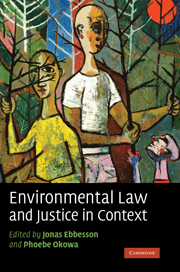Book contents
- Frontmatter
- Contents
- List of contributors
- Preface and acknowledgments
- 1 Introduction: dimensions of justice in environmental law
- Part I The notion of justice in environmental law
- Part II Public participation and access to the judiciary
- 6 Participatory rights in natural resource management: the role of communities in South Asia
- 7 Public participation and the challenges of environmental justice in China
- 8 Environmental justice through courts in countries in economic transition
- 9 Environmental justice through environmental courts? Lessons learned from the Swedish experience
- 10 Environmental justice in the European Court of Justice
- 11 Environmental justice through international complaint procedures? Comparing the Aarhus Convention and the North American Agreement on Environmental Cooperation
- Part III State sovereignty and state borders
- Part IV North–South concerns in global contexts
- Part V Access to natural resources
- Part VI Corporate activities and trade
- Index
- References
7 - Public participation and the challenges of environmental justice in China
from Part II - Public participation and access to the judiciary
Published online by Cambridge University Press: 28 June 2009
- Frontmatter
- Contents
- List of contributors
- Preface and acknowledgments
- 1 Introduction: dimensions of justice in environmental law
- Part I The notion of justice in environmental law
- Part II Public participation and access to the judiciary
- 6 Participatory rights in natural resource management: the role of communities in South Asia
- 7 Public participation and the challenges of environmental justice in China
- 8 Environmental justice through courts in countries in economic transition
- 9 Environmental justice through environmental courts? Lessons learned from the Swedish experience
- 10 Environmental justice in the European Court of Justice
- 11 Environmental justice through international complaint procedures? Comparing the Aarhus Convention and the North American Agreement on Environmental Cooperation
- Part III State sovereignty and state borders
- Part IV North–South concerns in global contexts
- Part V Access to natural resources
- Part VI Corporate activities and trade
- Index
- References
Summary
Introduction
It is commonly believed, in China, that the ultimate goal of the legal system is justice. Justice and fairness are closely intertwined in the literature, and in many respects the two terms are used interchangeably. Justice serves more like an ideology or fundamental principle in the Chinese legal context, while fairness, enlightened by justice, has been adopted as an applicable legal principle by civil law and practised widely. Aristotle's theory of justice, in both its distributive and corrective aspects, has been examined by Chinese scholars and used for interpreting functions of law and the legal system. Distributive justice refers to initial allocation of substantive rights or interests, procedures and opportunities by law and legal practice. Corrective justice stands first for the correction of abuse of substantive rights and interests distributed by law, public policy or private agreements; it also reflects the evolution of initially distributed rights and interests and procedures due to changes of social merits concerning overall justice. The latter mode of corrective justice could be regarded as originally distributed rights and interests.
Justice is a dynamic concept with a complex of merits; it ought to fluctuate with the changes of cultural, social and historic conditions. A combination of value in all aspects of a society constitutes a general benchmark of justice, and guides the mainstream of society in justice considerations from time to time.
- Type
- Chapter
- Information
- Environmental Law and Justice in Context , pp. 139 - 157Publisher: Cambridge University PressPrint publication year: 2009
References
- 4
- Cited by



